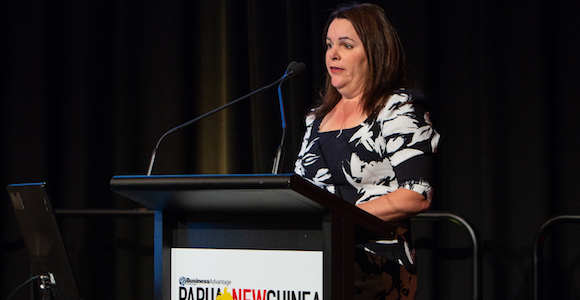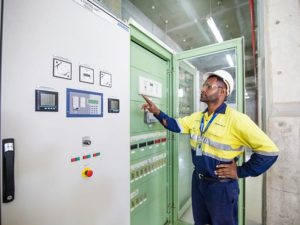PNG Power is aiming to cut tariffs by half and electrify 70 per cent of the country in the next five to 10 years according to Acting Managing Director Carolyn Blacklock. But to achieve those goals the organisation will require a new ‘business model’.

PNG Power’s Carolyn Blacklock. Source: BAI
Speaking at Business Advantage’s PNG Investment Conference in Brisbane, Blacklock said the aim has been to ‘live within our means and stop the cash haemorrhage.’
She said other objectives are: increase the use of low cost hydropower, increase revenues through reliability, improve safety and improve governance.
‘They are very simple things that are hard to execute. But we are seeing green shoots emerging.
‘At present, we join around 1600 new connections per year.
‘To achieve 70 per cent electrification we will instead need to join 125,000 new connections per year.
‘Most of our staff use their own vehicles.’
‘To achieve a 50 per cent reduction in tariff will require a new paradigm in energy supply with a return to low cost hydropower and other renewables.’
Staff
Blacklock said one of the first things she did was spend two months on the road meeting ‘most of the PNG Power team’.
‘The problems our people have to contend with, just to do the minimum, is a story of long processes to obtain very simple approvals.
‘There is no fleet; most of our staff use their own vehicles, or there is expensive hiring going on.
‘Buildings and equipment are in a terrible state of disrepair, with many condemned.
‘PNG Power has been burdened by a legacy of poor management.’
‘And yet, in amongst all this, is a group of people who are seeking a return to discipline and a sense of purpose and respect.
‘We formed a contract, them and I, that I would always tell them the truth, and they would dedicate themselves to the enormous task of turning the company around and, in doing so, turn our country around.’
Financials

A PNG Power worker at the Yonki Dam hydro power plant. Credit: PNG Power
Blacklock said PNG Power’s history has been bleak, partly because there has been a ‘revolving door’ of chief executives.
‘PNG Power has been burdened by a legacy of poor management, even poorer governance and sadly the company has failed to either reach its mandate or its potential.’
She said 7 per cent of customers provide 80 per cent of revenues ‘and about a quarter of all power that we produce is sold for free, or stolen.’
In some centres, she said, theft is as high as 50 per cent.
‘PNG Power produced a net profit after tax of K67 million as at December 2016.
‘That weakened to a loss of K5 million at the end of 2017 and the company was, frankly, in a very poor state of affairs at the beginning of this year.
‘Superannuation had not been paid since 2016. Landowners were owed six years worth of royalties.
‘Line clearing bills had been unpaid for years. There was a fine of US$2.5 million for licencing malpractice, and there were over K400 million of approved purchase orders with no funding in sight.’
Governance
Blacklock said PNG Power should end 2018 with a net profit after tax of ‘around K47 million’.
The company is paying unpaid bills, some from as far back as 2012.
‘We are now producing about 50 per cent of our power from hydropower (up from 30 per cent).
‘On our biggest system, Ramu, we have doubled the operating capacity of our hydro already, producing a saving of around K20 million for the remainder of the five months of this year.
‘As reliability has improved we have made some changes in customer services and leadership,. That is having a big impact on sales.
‘June was the biggest ever month for sales in PNG Power’s history.
‘We are now reporting on lost time injuries for the first time.
‘The greatest change, though, has been good governance. The rot has to stop at all levels.’
Nation builders
Blacklock says the new chairman, Peter Nupiri, is taking a strong stance against ‘sweetheart deals’ and ‘anything that is not in the best interest of PNG Power—[he] has been nothing short of phenomenal.
‘We have figured out that we are actually not a utility company but an army of nation builders.
‘We have a product, electricity, that only 13 per cent of our people have and everybody else wants.’








Speak Your Mind